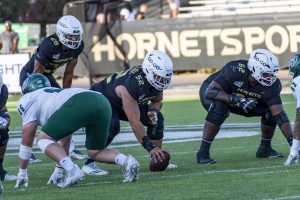Women faculty discuss discrimination, salary gap and promotion issues
April 25, 2001
In an effort to organize and unite Sacramento State?s women faculty members, a small group of female instructors discussed discrimination, salary gap and promotion issues at a meeting April 19.
The focus of the meeting was to develop a group of Sac State?s women instructors, possibly modeled after the California Faculty Association, which would give them more leverage in dealing with the various gender discrimination issues on campus. The group would help to strengthen the bond between female instructors, something men on campus have had for years, said Linda Current, a teacher education lecturer.
“For so many years, Sac State was an all-boys club, and they helped each other out,” Current said. “If we had the same thing, it would help.”
Among the issues discussed at the meeting were the difficulties faculty members?women in particular?face in gaining tenure, the salary differences between men and women and the difficulties Faculty Merit Increases will present to working mothers who don?t have the time to conduct research for bonuses. Teacher education lecturer Judy Judd said the FMI hurt instructors who don?t have time for research projects but get positive feedback from students.
“When [students] ask questions, I can give them some real-life explanations,” Judd said. “But my colleagues don?t value that because I?m not doing some esoteric research.”
Women have also had a hard time getting tenure positions, particularly since the trend the past few years has been to hire more lecturers, said geography lecturer Robin Datel. A study by the California State University Personnel Information Management System Database found that, from 1994-95 to 1999-00, CSU enrollment increased by more than 35,000 full-time students, but only had a net increase of one tenure faculty member during the same period.
“It just fundamentally needs to be rethought, or women are going to keep losing,” Datel said.
Judd said she was once passed over for a tenure position, which was then offered to a man who turned it down. Instead of offering the position to her afterwards, however, the administration decided not to give the position to anyone.
Age is also a concern when administrators are choosing instructors for tenure, Judd said. She pointed to an incident where a colleague was up for a tenure position, but was passed over because she was older.
“They said she?d only be there for 15 years,” Judd said.
This isn?t always the case for male faculty, said lecturer Maria Alexandrino. She said one time her department hired an older man to a tenure position. “But for us, the criteria shift. They want younger people.”
The group plans to compile information on promotions and salary in the coming months, and then design meetings for the fall. The ideal plan would be to talk to women in the College of Education and create a caucus from each college, Alexandrino said.
“If we start at the beginning of next semester, we could, in a month and a half, have one meeting a week,” Alexandrino said.
Coming from a background as an elementary school teacher, Judd said she was shocked to discover Sac State didn?t even have a faculty association until the ?70s. She said that groups like these hold much power at elementary education levels, and college faculty needs to step up to that level.
“When I compare an elementary [level] faculty to a college faculty, we are damn wimpy,” Judd said.
























































































































